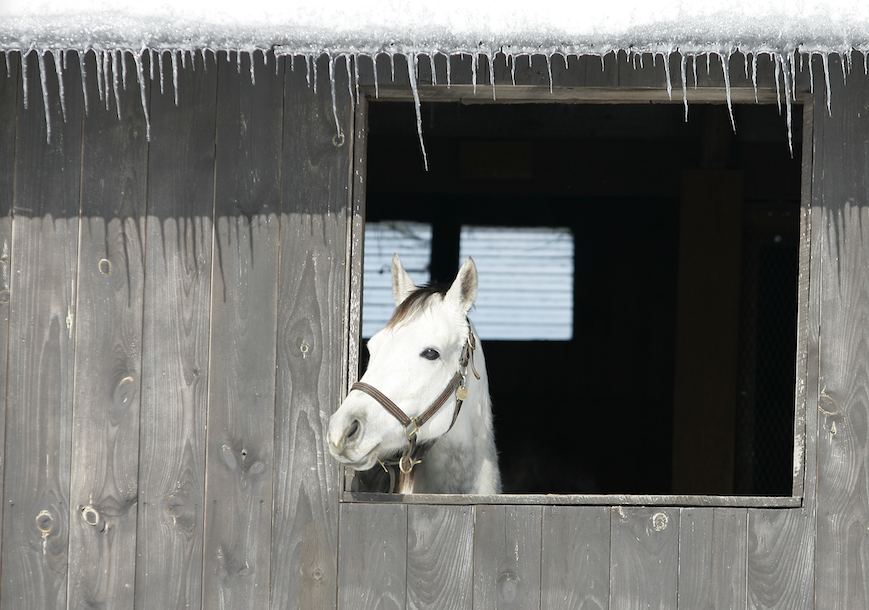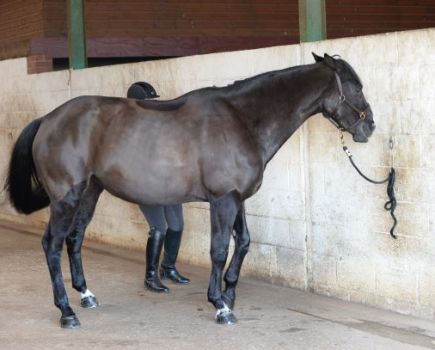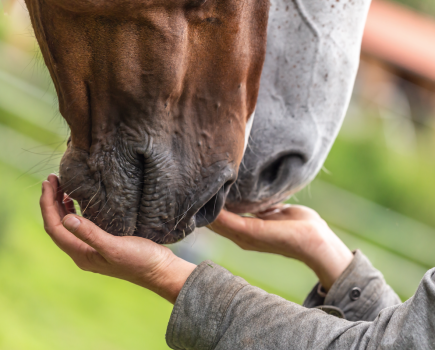Advertisement feature
Summer seemed to end dramatically this year. No sooner were we enjoying riding out on crisp autumn days than those frosty mornings start to creep in and we’re bracing ourselves for a few cold, dark challenging months as winter sets in.
Getting out of bed at the crack of dawn to go and see to our horses is a totally different experience in the winter. Low temperatures and wet, boggy ground means our four-legged equine friends need to spend more time in the stable.
Horses are naturally herd animals and in an ideal world they’d be living in a group with other horses, wandering for miles every day, constantly grazing.
But a cold, wet winter in the UK isn’t an ideal world and stabling a horse means that they can’t do the things they would normally do to keep themselves stimulated.
The Insurance Emporium provides specialist horse insurance. Here’s our advice about how to enrich a horse’s stable environment through those long winter months.
Muck out thoroughly
However nice it is to see your horse standing on a bed of deep straw, a thicker bed isn’t always ideal as it encourages bacteria and parasites — plus ammonia in urine can cause respiratory problems.
Rubber matting, even with a small amount of bedding, or with some shavings in a corner for urinating, is a good option for some horses and has the advantage that it can be swept out a couple of times a day.
Keep equipment clean
Keeping the stable clean, ventilated and as dust-free as possible is a good habit to get into.
Your horse’s feed buckets and water bowls, as well as yard tools, should be scrubbed weekly and general surfaces kept free of dust and cobwebs.
Make sure they always have access to clean water that’s not covered by ice when it’s really cold.
Monitor your horse
Monitor your horse carefully for changes in weight and behaviour, and keep an eye on their legs and coat for early signs of conditions such as rain scald or mud fever.
You should also keep an eye out for behaviour that might indicate stress or boredom in horses, such as weaving or box walking.
Access to forage
Horses eat little and often, so make sure they have enough forage to last through the night. If you are concerned about weight gain, you could swap it for a lower quality forage. In the case of hay, soaking it will reduce its sugar (calorie) content and then you can increase the quantity.
You could also use hay nets positioned around the stable with different qualities of feed inside. If you use the type with smaller holes, this could slow down the horse’s eating and make forage last longer.
Keep an eye on the temperature
Just because you feel cold, it doesn’t mean your horse will. They don’t feel the cold the same way we do, and feel comfortable with a body temperature that can range between 5°C and 25°C.
How cold they feel also depends on their age, health and whether or not they’ve been clipped.
As long as they have sufficient hay, they have great internal central heating and can generate and maintain their body heat.
If they are fit and healthy and have access to enough forage, they should be okay without rugs. They can increase their temperature but can’t reduce it, so being too wrapped up can be as uncomfortable for them as it would be for us.
Keep your horse occupied
This is the biggie. Horses need stimulation and you can help keep them occupied and entertained by leaving chopped fruit and veg around their stable, maybe in little nooks and crannies to encourage them to investigate their surroundings and give them more of a challenge.
You could also hang things up for them to nibble on using treat branches (choose a branch from a non-poisonous tree) with different things stuck to it, such as vegetables, dried fruit, Polos or jam.
You could also give the horse logs and branches to chew on or experiment with essential oils or herbs. Try a few out and see if your horse has a preference!
Ensure they’re hydrated
Salt is an important part of every horse’s diet. They need the electrolytes in sodium to regulate their nerve and muscle function, and if they don’t have enough, they won’t drink as much and could become dehydrated — including in winter.
A good way to ensure they always have enough is to provide them with salt licks. These can also help prevent a horse from getting bored.
Put together a toy box
You could also put together a toy box for a bit of supervised play. Things to include are:
- Rope
- Rubber dog toys
- Empty drinks cartons
- Old wellington boots with the toes cut off and stuffed with hay
- Things with an interesting smell/texture
- Some forage-based pellets at the bottom of the box, or scattered around the stable, to keep the horse busy and engaged
Be sociable
Horses still need to socialise through the winter and need to see other horses. Stable blocks aren’t the ideal setting for this, so at the very least make sure they can see other horses in the stables around them.
Barns with bars between the stalls are a much more sociable option and encourage physical contact.
If possible, walk your horse around the yard on a daily basis so that they can see and ‘speak’ to their friends. Some horses even like having a radio on.
Prepare early
It’s a good idea to be prepared before winter really sets in. Stock up on essentials, make any necessary repairs and make sure that your horse’s farriery, veterinary and dental care are all up to date.
Horses are very similar to puppies and toddlers in that they need company and stimulation, and there’s nothing like seeing your horse settled and content, particularly during the winter when neither of you can get out and do what you want.
Horse insurance
The Insurance Emporium’s horse insurance policies come with death, theft or straying as standard and you can then tweak them with a choice of optional benefits, leaving you with the kind of policy that suits you, your horse and your budget.
Head over to our website and get a free, no-strings, no-jargon quote today, along with up to a *30% discount, including a special **5% discount for Your Horse readers.
Visit theinsuranceemporium.co.uk/YH99 and enter promo code YH99 for 5% off your quote (include QR code if applicable).
*Enjoy a 20% introductory discount and, if you have more than one horse or pony in the family, then you can take advantage of the 10% multi-horse discount. The 20% introductory discount is available from the start of the policy until its first review/renewal date. The maximum discount is 30%.
** Offer ends 31/12/2025 and is not available in conjunction with any other promo code. Promo code discount is available from the start of the policy until its first review/renewal date.
Lifestyle Policy Limited is an appointed representative of The Equine and Livestock Insurance Company Limited. The Insurance Emporium is a trading name of The Equine and Livestock Insurance Company Limited (registered in England and Wales no: 294940), which is authorised by the Prudential Regulation Authority and regulated by the Financial Conduct Authority and the Prudential Regulation Authority no:202748.
All content provided in this blog is for informational purposes only. We make no representations as to the accuracy or completeness of any information on this site or found by following any link on this site.
We will not be liable for any errors or omissions in this information nor for the availability of this information. We will not be liable for any loss, injury, or damage arising from the display or use of this information. This policy is subject to change at any time.
We offer a variety of cover levels, so please check the policy cover suits your needs before purchasing. For your protection, please ensure you read the Insurance Product Information Document (IPID) and policy wording, for information on policy exclusions and limitations.
Main image © Shutterstock
‘









